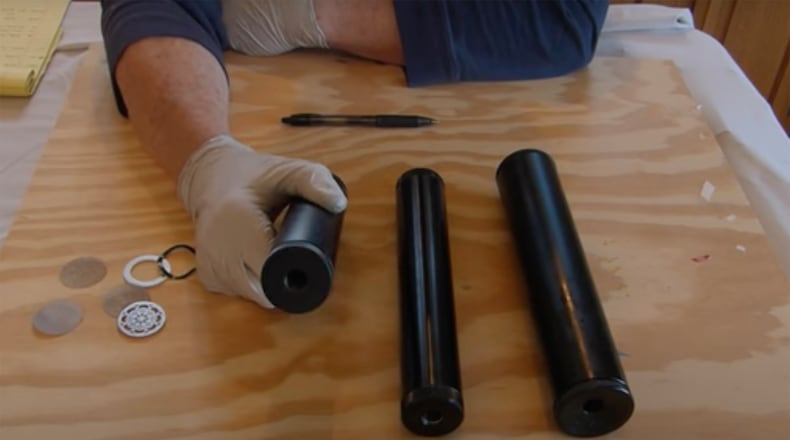In April, dozens of federal agents swarmed Wayne Hawkins’ rural Carroll County home armed with a warrant to seize assets, shut down his business and gather evidence of something he claims he never sold: illegal firearm silencers.
The U.S. Bureau of Alcohol, Tobacco and Firearms targeted Hawkins’ business, Hawk Innovative Tech, because it sold “solvent traps,” cylindrical tubes that fit on the end of a gun. The traps are designed to catch cleaning solvents, but they can easily be modified into silencers. In fact, there are dozens of YouTube videos showing how it is done, including some specifically for Hawk Innovative Tech’s merchandise.
The ATF has paid increasing attention to the proliferation of unregistered silencers, also known as “suppressors” for their ability to suppress gunfire noise. The bureau has targeted companies that specialize in selling solvent traps, as well as fuel filters that can be similarly modified, in ways that allegedly cater to law breakers.
“The possession of unregistered suppressors marketed as ‘solvent traps’ or ‘fuel filters’ is a crime that has a direct impact on public safety,” Benjamin P. Gibbons, special agent in charge of the ATF’s Atlanta field office, said in a statement.
Gibbons said the ATF is concerned about the proliferation of solvent traps being used as unregistered silencers. In an unrelated proceeding earlier this month, Michael Helterbrand, a member of a violent extremist group, was sentenced to 20 years in prison in foiled plot to murder a Bartow County couple. As part of the preparation for the attack, Helterbrand bought a solvent trap to muffle the sound of gunshots, prosecutors said.
Over the past several years, the ATF has raided gun companies selling solvent traps in Utah, Arizona and Pennsylvania, seizing their websites and assets in a way similar to the raid on Hawk Innovative Tech.
In the Hawk Innovative Tech raid, ATF agents seized nearly $300,000 in cash from multiple bank accounts owned by Hawkins, his wife and his business, along with thousands in silver bars and coins. The ATF justified the seizures by saying in court filings that the funds are “traceable” to acts of mail and wire fraud, smuggling, and money laundering. The filing names Hawkins, his wife and two of his adult sons.
“It’s pretty devastating,” said John Monroe, Wayne Hawkins’ attorney. “They basically declared financial war against him.”
The Hawkinses deny the accusations, and no charges have been filed, but federal prosecutors describe the matter as “an ongoing criminal investigation.” Importing, making or selling unregistered silencers carries a possible 10-year prison sentence.
Gun owners can buy or make silencers legally, but doing so is a cumbersome and costly process. The approval process takes months and subjects the applicant to federal and local law enforcement scrutiny.
The court records suggest ATF believes Hawkins knowingly sold the solvent traps to customers so they convert them to illegal silencers by drilling a hole in them. The converted solvent trap allows the bullet to pass through a series of baffles that muffle the gunfire sound as the bullet emerges through the drilled hole.
The Hawk Innovative Tech solvent traps sell for hundreds of dollars apiece. Sales of the traps have generated about $2.9 million since the business was founded in 2017, the ATF claims. In its complaint, the ATF also claims Hawkins should have applied for a firearms manufacturer license and paid an annual occupational tax of $1,000. But Monroe said the items are not silencers.
“If it’s really a solvent trap, it completely has a non-suppressor purpose,” he said. “It actually can’t be used as a suppressor because the whole idea of a solvent trap is to trap the solvent. If it’s open on the end so that it might be usable as a suppressor, then it is not very usable as a solvent trap.”
Hawkins can’t be held responsible for what purchasers do with the traps once they leave his shop, Monroe said.
In October, Hawk Innovative Tech filed suit against the U.S. government in District Court for the Northern District of Georgia, asking the court to declare that the manufacture and sale of solvent traps does not violate federal firearms laws. Monroe, who filed the lawsuit on behalf of his client, said it is not clear what the federal position is on them.
“I don’t believe they fit the definition of a suppressor, but you’d have to ask the ATF what they think,” he said.
The targeting of solvent trap retailers has provoked an angry response from gun rights advocates. They say the ATF is making it difficult for gun owners who legally apply for permission to manufacture a silencer from a solvent trap by driving manufacturers out of business.
“This is once again another frustrating example of the ATF’s ‘on a whim’ enforcement and regulation-making that makes an already tense portion of the firearms industry even more of a struggle to deal with,” one popular firearms blog opined.
About the Author
Keep Reading
The Latest
Featured



